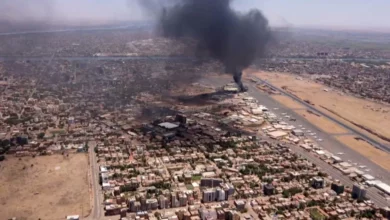Khartoum – The Sudanese army will continue to fight by all available means to stop the rebellion in South Kordofan, its spokesman said on Thursday, as concern grew over the humanitarian impact of the conflict.
"Until this moment we are continuing our operations in the hills around Kadugli, to stop this rebellion…We will continue to fight by all the means we have," Sawarmi Khaled Saad told a news conference in Khartoum.
Heavy fighting in Sudan's embattled border state, between the northern army and allied militiamen against troops aligned to southern former rebel group the Sudan People's Liberation Army (SPLA), has raged since 5 June.
World leaders including US President Barack Obama and UN chief Ban Ki-moon have called for an immediate ceasefire.
The conflict has so far caused more than 60,000 people to flee their homes, according to UN estimates, with the UK-based charity Save the Children saying on Thursday that 30,000 of those displaced were children.
"We are desperately worried about children currently displaced by fighting. We are racing against time to deliver support…before the rains," said the charity's country director Said Amin El-Fadil.
Earlier, the UN emergency relief coordinator, Valerie Amos, said she was "extremely alarmed" about the impact of the conflict on the local population.
"I am extremely alarmed by the violence that has engulfed South Kordofan in Sudan since 5 June and the increasing reports of civilians being targeted," Amos said in a statement.
"Humanitarian organizations are delivering aid where they can, but their ability to help most of those in need is seriously compromised by insecurity and lack of access," she added.
The army spokesman dismissed claims that it was aggravating the humanitarian situation, instead blaming the state's former deputy governor, Abdelaziz al-Hilu, himself a senior SPLA commander, for starting the rebellion.
"Our role is to protect the civilian population and we have carried out these operations to protect the civilians and the roads in South Kordofan," he said.
The SAF (northern army) appeared to step up its air strikes on former rebel strongholds in the Nuba Mountains earlier this week, which the UN peacekeeping mission in Sudan (UNMIS) said was causing "huge suffering" to civilians.
The mission said on Thursday that the closure of South Kordofan's airspace was dangerously hampering its distribution of emergency aid.
"It is vital that the government of Sudan acts immediately to ensure access to all airspace by UN flights, to alleviate the growing suffering of those most affected by the conflict," UNMIS spokesman Kouider Zerrouk told AFP.
Religious leaders and human rights activists have charged that the bombing campaign forms part of a government policy of ethnic cleansing, targeting the indigenous Nuba peoples who fought with the SPLA during the 1983-2005 civil war.
Khartoum has vowed to disarm northern troops aligned to the SPLA, thought to number around 40,000, saying it will not tolerate the existence of two armies within its borders after south Sudan gains full international recognition on 9 July.
Ibrahim Ghandour, a senior official within the ruling National Congress Party, went further on Thursday, saying that the northern branch of the SPLM, the SPLA's political wing and the ruling party in the south, will not be allowed to continue in its present form.
"There is no way for the SPLM to continue as a party in north Sudan after 9 July, because it is the party of another country, and its leader, Salva Kiir, is president of another state," he told the reporters at the news conference.
"If they want to continue they will have to create a new party."
Tensions between north and south Sudan have been running high since the northern army overran the disputed border region of Abyei last month, in response to an attack on a convoy of SAF troops and UN peacekeepers.
Abyei is the most sensitive and intractable of a raft of issues that the two future states are struggling to resolve ahead of the south's formal declaration of independence in less than four weeks.




